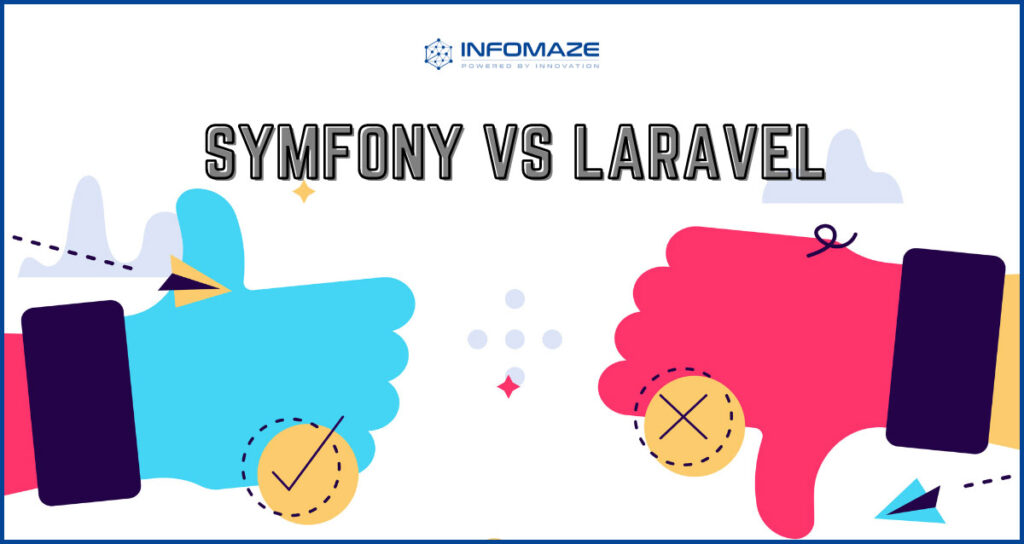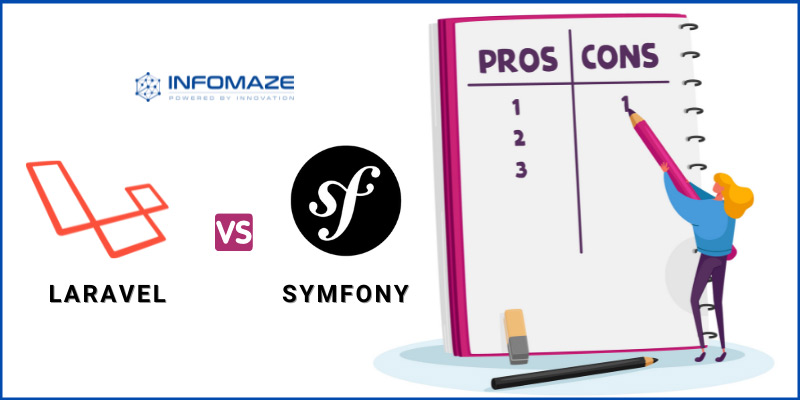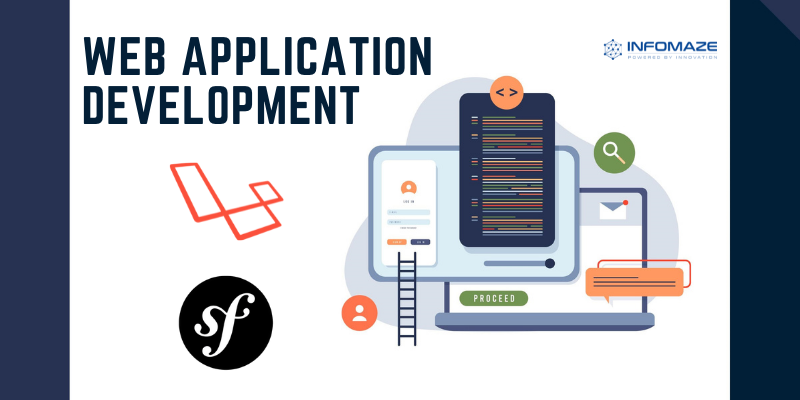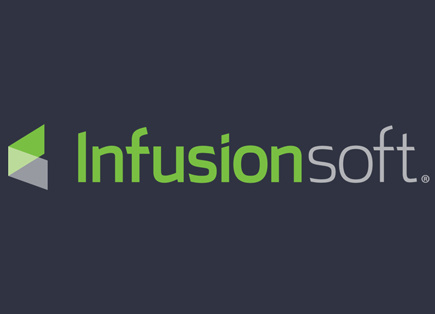Symfony vs Laravel: A PHP Framework Comparison!
Before starting any new project on an enterprise web application development, deciding on which framework to choose is crucial. PHP frameworks have been in the limelight as they provide definitive coding practices and standards. Among the many out there, including CakePHP, CodeIgniter, Yii, Aura, Silex, Flight, Laravel, and Symfony, we have chosen the two most popular PHP frameworks.
In this article, we are comparing the PHP frameworks frequently chosen by web developers: Laravel and Symfony.
Depending on the project requirements, you can decide which PHP framework to go with as both the frameworks have their own advantages and disadvantage, similarities and dissimilarities. We elaborate the same while also recommending when to choose which framework for PHP custom web development.
Read on to know more or talk to our consultants if you have an immediate project requirement.
Quick Comparison between Laravel PHP and Symfony PHP Frameworks.
Laravel:
Laravel is an open-source, server-side, real-time framework under MIT license, which uses the MVC design pattern and reuses existing components of frameworks while building web apps: Yii, CodeIgniter, & Ruby on Rails. Built as an alternative to CodeIgniter originally, it is now one of the most popular frameworks on GitHub, and It is made up of 30% Symfony.
Initially released in 2011, we are mostly referring to versions above Laravel 4 in this article. The latest version, Laravel version 8.3.0, with new features including Tailwind CSS, Laravel Jetstream, model factory classes, migration squashing, comes with more usability enhancements. Simple coding and an easy learning curve for the expressive syntax enable less development time.
The framework is backed by strong community support and offers tools for routing, HTML templates & authentication, testing, and more. It can be used to build applications from pre-defined customized backend logic, web portal, templates, architectures to full-stack apps with SaaS product management. The framework comes with its out-of-the-box core features, which we will highlight in the upcoming sections, and has a high market value.

Symfony:
Symfony is a reliable, mature, open-source framework that also follows the MVC framework and present under the MIT license.
The framework is influenced by the Spring framework from Twig as a template engine, Doctrine as layers with object-relational mapping to PHPUnit for testing, among others. Symfony has decoupled components similarly to Laravel. Considering Symfony 2, released in 2011, has a lesser market share with the latest version released: Symfony version: 5.1.3 has an active community. The framework is mostly used for scalable, enterprise-level, large, and complex web application development projects. Symfony provides easy debugging, testing and follows an agile project management RAD environment for development.
Although Symfony has a harder learning curve compared to Laravel, learning Symfony also helps in understanding the Laravel framework better as Laravel uses third-party Symfony components libraries and utilizes more than 14 components.
Similarities between Laravel and Symfony
- The Laravel and Symfony frameworks are PHP-based, open-sourced
- Both the frameworks are built on the Model-View-Controller (MVC) architecture.
- They are used to build cross-platform web applications operable on different computing platforms.
- The framework shares a range of common features including, multilingual content, scaffolding, text search, multi-user system, multiple projects, similar ORM (Object-relational mapping), to name a few.
Although the similarities are quite in number, the dissimilarities between Symfony and Laravel exist. The difference is what makes a choice between the two frameworks crucial while building web application development.
Dissimilarities between Laravel and Symfony
- Symfony allows the utilization of C# and Java while Laravel utilizes magic methods, simplifying its code.
- Symfony is preferred for complex, enterprise web applications, while Laravel is chosen for modular, robust solutions.
- Even though the ORM used in the frameworks are similar, Symfony uses Doctrine while Laravel uses Eloquent.
- The template design used is Twig in the case of Symfony and Blade in the case of Laravel (allows reusability of code).
- While the Laravel community is large, the community of Symfony is highly active in solving issues and present in about 120 countries.
- When it comes to scalability, Symfony has a higher value as Laravel users need thorough knowledge in coding to make it scalable.
Looking at the similarities and dissimilarities, we can only say each framework has its own advantages and disadvantages. Listing pros and cons list will help us define the basis upon which we distinguish which framework to use for a particular web application development.
Pro and Cons - Symfony vs Laravel
Pros of Laravel:
- The latest version of PHP features gets updated.
- Allows the integration of email services through API integration.
- A huge ecosystem of pre-packaged tools for user authentication, testing, and others for building the application.
- The templating system allows easy navigation even in complex web-layouts.
- Artisan CLI: Helps implements custom commands, manage databases and migrations with boilerplate codes. It offers automation in recurring tasks.
- Routing: Reverse routing helps create unique URIs (Uniform Resource Unifier) and helps automate the propagation of changes.
- Testing: Automated and less time-consuming with PHPUnit-based expressive testing methods.
Cons of Laravel:
- The codes in the newest updated version might break due to code-incompatibility.
- Backend congestion might occur due to the lightweight framework leading to lower performance.
- Applications built on Laravel could be heavy for mobile fast-loading.
- With a larger community comes the difficulty in accessing quality-certified third-party libraries.

Pros of Symfony:
- The framework allows reusable components for multiple uses, thereby saving developers time.
- Symfony is flexible in the usage of other codes during customization of web applications, including c# and Java
- The Symfony community is highly active and one of the biggest in the market
- Highly scalable with expandable functionality using preloaded bundles
- Secure and stable across all versions.
Cons of Symfony:
- Hard learning curve making it difficult for beginners.
- Slows application performance when using different technologies.
- Even with reusable components, development time is much slower when compared to other frameworks.
- Testing the code is time-consuming due to slow assessment of Parser and lever codes.
A Deeper Comparison of the Features of Laravel and Symfony
MODULARITY AND SCALING
Laravel: Due to the pre-built dependencies on MVC, the flexibility of the framework is reduced. But remains user-friendly when using MVC.
Symfony: With better-organized codes and reusable components, the framework offers great modularity.
TEMPLATING ENGINE
Laravel: The template engine used allows reusability of code along with the perfect match for building APIs with the sub-framework, Lumen.
Symfony: The default template engine used is Twig, which can be used to write web designer-friendly and concise templates, resolves issues portability.
DATABASE SUPPORT
Laravel: Supports SQL Server, MySQL, PostgreSQL, and SQLite databases for data access through object-relational mapping (ORM) through Eloquent.
Symfony: Supports Oracle, Drizzle, MySQL, PostgreSQL, SQLite, SQL Server, SAP Sybase SQL Anywhere, and other databases with object-relational mapping (ORM) for data access through Doctrine.
DATABASE MIGRATIONS
Laravel: Does not require defining fields during manual database migrations.
Symfony: Automatic data migrations require defining the fields within the model.
DATA MODELING
Laravel: SQL knowledge is required. The template engine ties to the DB schema, making its flexibility reduced.
Symfony: Calling and creating a repository that does not require SQL knowledge.
When to Choose Laravel over Symfony and Vice versa?
Choose Laravel:
- When you want a web application to be developed with less time with the readily available implementations.
- If you need easy authorization and automation in processes including queueing, routing, caching, and sessions.
- When you want to ease the development process through Magic Methods and traits available with this framework.
- When developing fast-performing applications for small projects and quick delivery.
- If you require a scalable server-side framework with excellent documentation and an SEO-friendly website.
Choose Symfony:
- For enterprise-level, large-scale web applications for the internet as well as the intranet, the framework comes without any built-in dependencies, which is ideal for complex projects.
- Flexibility in configuring with no pre-set logic while combining bundles and components.
- When you need to alter only a part of the framework architecture and personalizing the application further in the future.
- You want to create single-page applications and real-time data synchronization.
Conclusion:
- Among the two PHP frameworks, the most popular being Laravel, you get great support for the same. While Symfony has one of the largest communities as well.
- The choice of the framework should depend on the web application to be developed; choose Laravel if you need faster delivery and performing application, while choose Symfony if you need a highly optimized, stable, and complex web application. Even with slower performance, you get easily extensible options.
- Agreed, the same is possible with Laravel, it completely depends on the kind of logic to be used and configurations required. Finally, the most significant thing being a good hold on the framework, the more comfortable the developer is with the framework, the faster and hassle-free the development process will commence.
Planning to Build a Web Application for your Business and need help?

Being a solution provider for almost two decades in the IT industry and working with Laravel and Symfony with developers with a minimum of 5+ years of experience, we hold real-life experiences building applications for SMEs and large enterprises.
With our expertise, we have provided web applications of varying complexity for different industry verticals for purposes meant to suit the business specifically.Having continually providing web applications development services for our clients and having them come to us for their other business solutions, we maintain a high customer retention rate.
Hence, our PHP Laravel developers and PHP Symfony developers decide which framework would best suit your application and bring to you innovative, smart web applications that take your business to the next level. We let you rest assured while we build you the web application your business needs.
Categories
- AI/ML (6)
- Application Migration (8)
- BI (7)
- Case Study (28)
- CRM (8)
- Dot Net (8)
- Informational Blog (71)
- IT Help Desk (8)
- Mern Stack (1)
- Microsoft 365 (2)
- Mobile Application (9)
- Offshore Development (10)
- Outsourcing Services (1)
- PHP (11)
- PowerBI (7)
- QuickBooks (6)
- ReactJS (4)
- SEO (14)
- SharePoint (3)
- Web Application (10)
- Xero (1)
- Zoho (15)
- Zoho Case Study (36)




Disclaimer: All rights belong to the owner. No Copyright or Trademark Infringement Intended.





